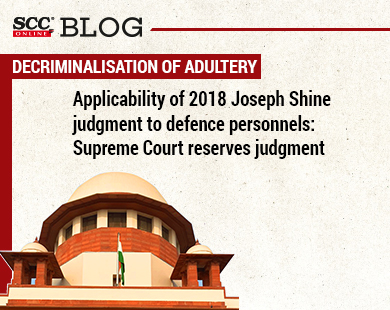Supreme Court: The Constitution Bench comprising of K.M. Joseph, Ajay Rastogi, Aniruddha Bose, Hrishikesh Roy and C.T. Ravikumar J.J., reserved its judgment dated 31-01-2023 on the issue pertaining to an application filed by the Department of Military Affairs seeking clarification of the Constitution Bench judgment dated 27-09-2018 Joseph Shine v. Union of India, (2019) 3 SCC 39 (‘2018 Judgment’).
While deciding the constitutional validity of Section 497 of the Penal Code, 1860 (‘IPC’), vide its 2018 judgment, it was held that:
1. Section 497 of IPC was held to be violative of Article 14, 15 and 21 of the Constitution was thus struck down.
2. Section 198(2) of Code of Criminal Procedure, 1973 was held to be unconstitutional to the extent that it was applicable to the offence of Adultery under Section 497 of IPC
3. The decision of Sowmithri Vishnu v. Union of India, (1985) Supp SCC 137, V. Revathi v. Union of India, (1988) 2 SCC 72 and W. Kalyani v. State, (2012) 1 SCC 358 stood overruled.
The petitioner posed important questions of law for consideration before the bench:
a. Whether the persons subject to Army Act by virtue of Article 33 of Constitution of India being a distinct class should continue to be subject to the rigors of Section 497 of IPC by making an exception in regard to application of ibid Section 497 of the IPC vis a vis person subject to Army Act
b. Whether the promiscuous or adulterous acts by persons subject to Army Act should be allowed to be governed by the provisions of Section 45 or Section 63 of the Army Act, 1950 under corresponding provisions of Navy Act and Air Force Act being special legislation irrespective of the 2018 judgment by treating it as an abrogation of Fundamental Rights (‘FR’) provided by law in terms of Article 33 of Constitution of India.
c. In view of Article 33 of the Constitution, whether the 2018 judgment would prevent the Armed Forces from proceeding against a person subject to the Army Act, who is guilty of what would in effect be an adulterous act.
d. Whether an adulterous relationship by a male or a female subject to the Army Act can be a matter for action under Section 63 or Section 45 of the Act and under Sections 45 or 65 of the Air Force Act and Sections 54 (2) or 74 of the Navy Act being special legislation and considering the requirements of discipline and proper discharge of their duty?
The petitioner submitted that unlike Section 497 of IPC, the Armed Forces do not make a difference between a man and a woman, who is subject to the Army Act, if they are guilty of an offence. It was also submitted that the 2018 judgment may cause instability within the applicant’s services since the defence personnels function in peculiar conditions who are separated from their families for long durations when posted on borders under challenging conditions, in view of the 2018 judgment, there will always be a concern in their minds about the family indulging in untoward activity.
The petitioner further submitted that there was a reason why the framers of the Constitution had authorised Parliament to restrict or abrogate certain FR in their application to armed forces to ensure proper discharge of duties and maintenance of discipline.
Posing strong objection against the miscellaneous application, it was stated that such an application for clarification was filed after a delay of more than 2 years and 6 months with no reasonable grounds made for condoning the delay.
It was further stated that the scope of the 2018 judgment was limited to the extent of determining the constitutional validity of Section 497 of IPC alone which did not examine the legal validity of penalising adultery. The said application seeks to determine the scope of penalising adultery under the Army Act, Airforce Act and the Navy Act which is determinable only in a separate writ petition.
Further, the worry raised in the application for clarification that the discipline in the defence forces would somehow be affected by the 2018 judgment had no legal foundation since casual apprehension was insufficient to require any clarification of the 2018 judgment.
It was contended that the 2018 judgment had no application in cases where disciplinary proceedings were initiated against employees on the grounds of adultery. The only consequence of the judgment was that adultery ceased to be a criminal offence and was not a part of IPC. Thus, no further clarification was necessary in this regard.
It was further contended that decriminalisation of adultery did not vitiate national security and the application had failed to show a reasonable nexus between the commission of adultery and indiscipline resulting in national security breach.
It was also pointed out that the review petition against the 2018 judgment was already dismissed in 2020 and an application for clarification seeking to revive a criminal provision regarding a class was unjustified which breaches all settled principles of law. The 2018 judgment had reached finality under Article 141 of the Constitution, and there exists no legal process known to law by which such a judgment can be reviewed or modified any more in the way sought by the applicant
The bench reserved the matter for order on 31-01-2023
[Joseph Shine v. Union of India, 2023 SCC OnLine SC 149, reserved on 31-01-2023]
*Simran Singh, Editorial Assistant summated the data.






